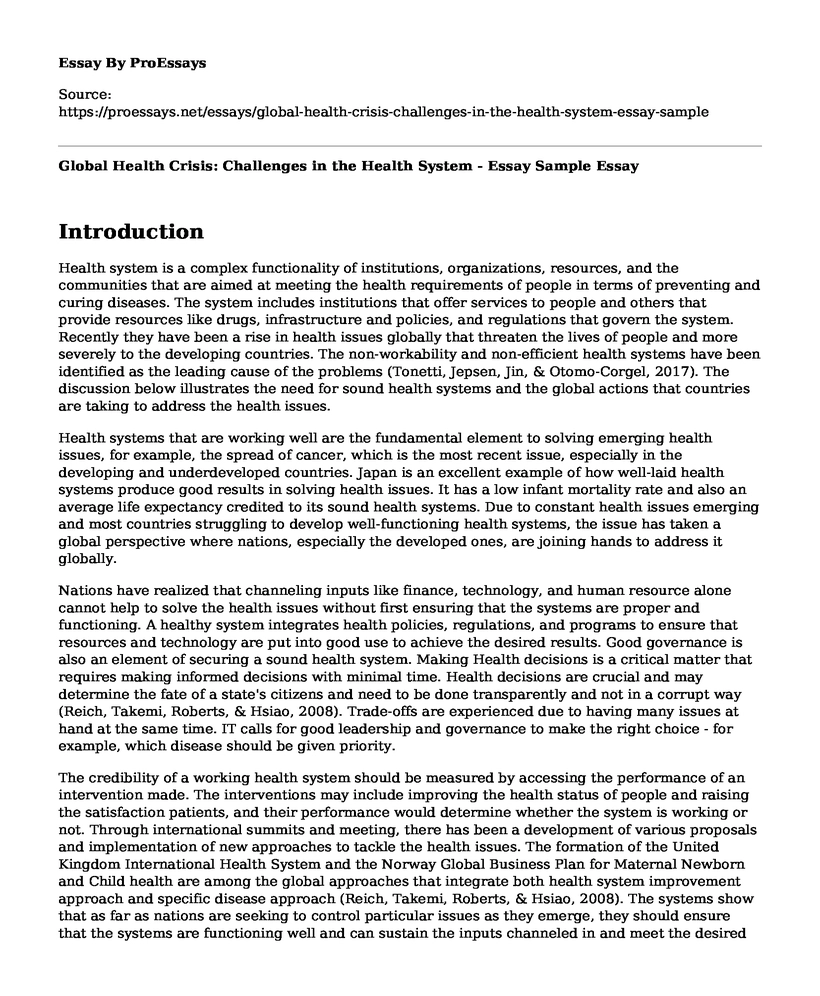Introduction
Health system is a complex functionality of institutions, organizations, resources, and the communities that are aimed at meeting the health requirements of people in terms of preventing and curing diseases. The system includes institutions that offer services to people and others that provide resources like drugs, infrastructure and policies, and regulations that govern the system. Recently they have been a rise in health issues globally that threaten the lives of people and more severely to the developing countries. The non-workability and non-efficient health systems have been identified as the leading cause of the problems (Tonetti, Jepsen, Jin, & Otomo-Corgel, 2017). The discussion below illustrates the need for sound health systems and the global actions that countries are taking to address the health issues.
Health systems that are working well are the fundamental element to solving emerging health issues, for example, the spread of cancer, which is the most recent issue, especially in the developing and underdeveloped countries. Japan is an excellent example of how well-laid health systems produce good results in solving health issues. It has a low infant mortality rate and also an average life expectancy credited to its sound health systems. Due to constant health issues emerging and most countries struggling to develop well-functioning health systems, the issue has taken a global perspective where nations, especially the developed ones, are joining hands to address it globally.
Nations have realized that channeling inputs like finance, technology, and human resource alone cannot help to solve the health issues without first ensuring that the systems are proper and functioning. A healthy system integrates health policies, regulations, and programs to ensure that resources and technology are put into good use to achieve the desired results. Good governance is also an element of securing a sound health system. Making Health decisions is a critical matter that requires making informed decisions with minimal time. Health decisions are crucial and may determine the fate of a state's citizens and need to be done transparently and not in a corrupt way (Reich, Takemi, Roberts, & Hsiao, 2008). Trade-offs are experienced due to having many issues at hand at the same time. IT calls for good leadership and governance to make the right choice - for example, which disease should be given priority.
The credibility of a working health system should be measured by accessing the performance of an intervention made. The interventions may include improving the health status of people and raising the satisfaction patients, and their performance would determine whether the system is working or not. Through international summits and meeting, there has been a development of various proposals and implementation of new approaches to tackle the health issues. The formation of the United Kingdom International Health System and the Norway Global Business Plan for Maternal Newborn and Child health are among the global approaches that integrate both health system improvement approach and specific disease approach (Reich, Takemi, Roberts, & Hsiao, 2008). The systems show that as far as nations are seeking to control particular issues as they emerge, they should ensure that the systems are functioning well and can sustain the inputs channeled in and meet the desired goals.
At international levels, countries are advised to take three significant approaches to improve the health systems. The first approach is developing a health system strategy that involves the beneficiaries and the state or the sponsoring organization. The method creates a sense of responsibility and participation among the recipients and helps to keep a check and ensure the accountability of the health providers. The second approach is balancing the support of both developing health systems as well as solving specific disease approaches by global donors and organizations such as the World Health Organization. Lastly, the global communities are investing more on enhancing knowledge on healthy systems on the developing countries. Most of the nations have access to resources and inputs but are ignorant about the ways to develop well-functioning health systems.
Conclusion
In conclusion, nations across the globe have realized that proper solving of emerging health issues does not only rely on channeling health inputs like drugs and finance but also ensuring that the health systems are working in a way that they are productive. The global summits and meetings are calling for nations to embrace strategies that seek to improve health systems.
References
Reich, M. R., Takemi, K., Roberts, M. J., & Hsiao, W. C. (2008). Global action on health systems: a proposal for the Toyoko G8 summit. The Lancet, 371(9615), 865-869. doi:10.1016/s0140-6736(08)60384-0
Tonetti, M. S., Jepsen, S., Jin, L., & Otomo-Corgel, J. (2017). Impact of the global burden of periodontal diseases on health, nutrition, and wellbeing of mankind: A call for global action. Journal of Clinical Periodontology, 44(5), 456-462. doi:10.1111/jcpe.12732
Cite this page
Global Health Crisis: Challenges in the Health System - Essay Sample. (2023, Feb 17). Retrieved from https://proessays.net/essays/global-health-crisis-challenges-in-the-health-system-essay-sample
If you are the original author of this essay and no longer wish to have it published on the ProEssays website, please click below to request its removal:
- Evidence-Based Practice Paper: Fall Prevention among Patients
- American Heart Association, Inc. Financial Reporting Review
- Best Practices for Screening and Early Treatment for HIV in the Latino Community
- Foundation of Medicine County Herbs Apothecary
- Essay Sample on Reducing Spread of Infectious Diseases: Hand Hygiene in Healthcare Settings
- Essay on Infection Control: A Cross-Sectional Study of Staff Compliance and Education
- Managing Interruptions in Medical Administration: A Critical Analysis and Practical Solutions - Paper Sample







